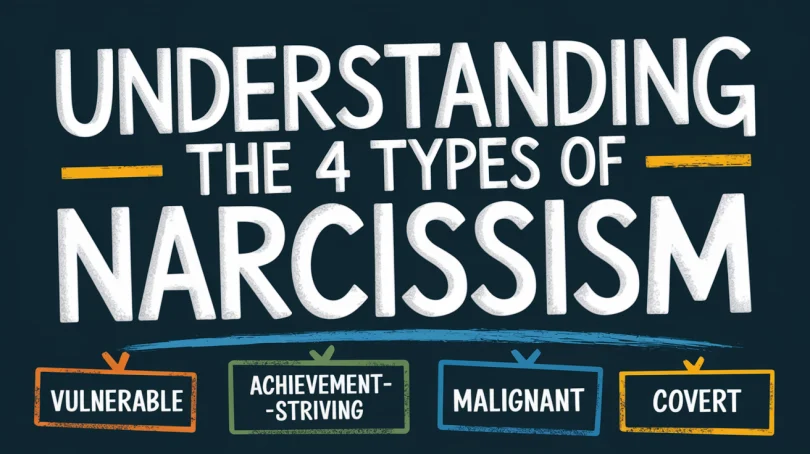The Prevalence of Narcissism
Narcissism is a prevalent personality trait that affects a significant portion of the population. a leading psychologist and author, the percentage of people who exhibit noticeable narcissistic tendencies is estimated to be around 10 to 15%. This means that in a room of 20 people, one or two may be classified as narcissists.
The prevalence of narcissism can vary depending on the environment and the types of individuals present. Dr. Durvasula notes that certain professions and social circles, such as the legal or financial sectors, may have a higher concentration of narcissistic individuals compared to more community-oriented settings.
The Four Types of Narcissism
While narcissism is often viewed as a singular concept, research has identified four distinct types of narcissism, each with its unique characteristics and manifestations.
The Grandiose Narcissist
The grandiose narcissist is the classic representation of narcissism. This type of narcissist is characterized by a sense of egotism, arrogance, and a constant need for attention and validation. They often boast about their achievements, possessions, and perceived superiority, with little regard for the needs or feelings of others.
The Malignant Narcissist
The malignant narcissist is a more problematic and dangerous form of narcissism. This type of narcissist not only exhibits the grandiose and entitled behaviors of the classic narcissist, but they also lack empathy and are willing to engage in unethical or even criminal behavior to serve their interests. Malignant narcissists may steal, cheat, or harm others without remorse, making them a significant threat in both personal and professional settings.
The Covert Narcissist
The covert narcissist is a more subtle and secretive form of narcissism. These individuals often feel that the world has wronged them and that their talents and abilities have been overlooked. They may present themselves as victims, constantly complaining about their circumstances and feeling that they have been unfairly treated. Covert narcissists are highly sensitive to criticism and may react with anger or withdrawal when their grandiose self-image is challenged.
The Communal Narcissist
The communal narcissist is a fascinating and often overlooked type of narcissist. These individuals present themselves as altruistic, philanthropic, and deeply concerned with the welfare of others. They may be heavily involved in charitable organizations, social causes, or community initiatives, but their underlying motivation is not genuine empathy or a desire to help, but rather a need for recognition, validation, and the perception of being a “good” person. Communal narcissists often seek accolades and attention for their “good deeds” and may become upset if they do not receive the level of recognition they feel they deserve.
Recognizing the Signs
Identifying the different types of narcissism can be challenging, as each type may present different behaviors and characteristics. However, some common signs to look for include:
- Grandiose Narcissist: Displays a sense of entitlement, arrogance, and a constant need for attention and validation.
- Malignant Narcissist: Engages in unethical or even criminal behavior, with a lack of empathy and remorse for their actions.
- Covert Narcissist: Feels victimized by the world, is highly sensitive to criticism, and may present with symptoms of depression.
- Communal Narcissist: Appears altruistic and philanthropic, but their actions are driven by a need for recognition and validation rather than genuine concern for others.
The Impact of Narcissism on Mental Health and Success
The pursuit of narcissistic tendencies can have significant implications for an individual’s mental health and overall well-being. Dr. Durvasula notes that while narcissism may help some individuals achieve success in certain areas, such as business or wealth accumulation, it can also lead to a lack of empathy, emotional detachment, and an inability to form meaningful connections with others.
Interestingly, Dr. Durvasula also discusses the concept of “acquired narcissism” or “acquired entitlement,” where individuals who have achieved a high level of success and privilege may develop a sense of entitlement and a lack of consideration for others. This can occur when individuals become accustomed to the world catering to their needs and expectations, and they struggle to adapt to more “normal” social interactions.
Ultimately, the impact of narcissism on mental health and success is a complex and multifaceted issue. While narcissistic traits may help some individuals achieve outward success, the internal toll on their well-being and relationships can be significant. Understanding the different types of narcissism and recognizing the signs can be crucial in navigating this challenging landscape.
Conclusion
Narcissism is a prevalent and multifaceted personality trait that affects a significant portion of the population. By understanding the four distinct types of narcissism – the grandiose, malignant, covert, and communal narcissist – individuals can better recognize the signs and patterns of this complex personality disorder. Recognizing the impact of narcissism on mental health and success is crucial, as the pursuit of narcissistic tendencies can come at a significant personal cost. By cultivating empathy, emotional intelligence, and a genuine concern for others, individuals can find a healthier path to personal and professional fulfillment.







Leave a Comment